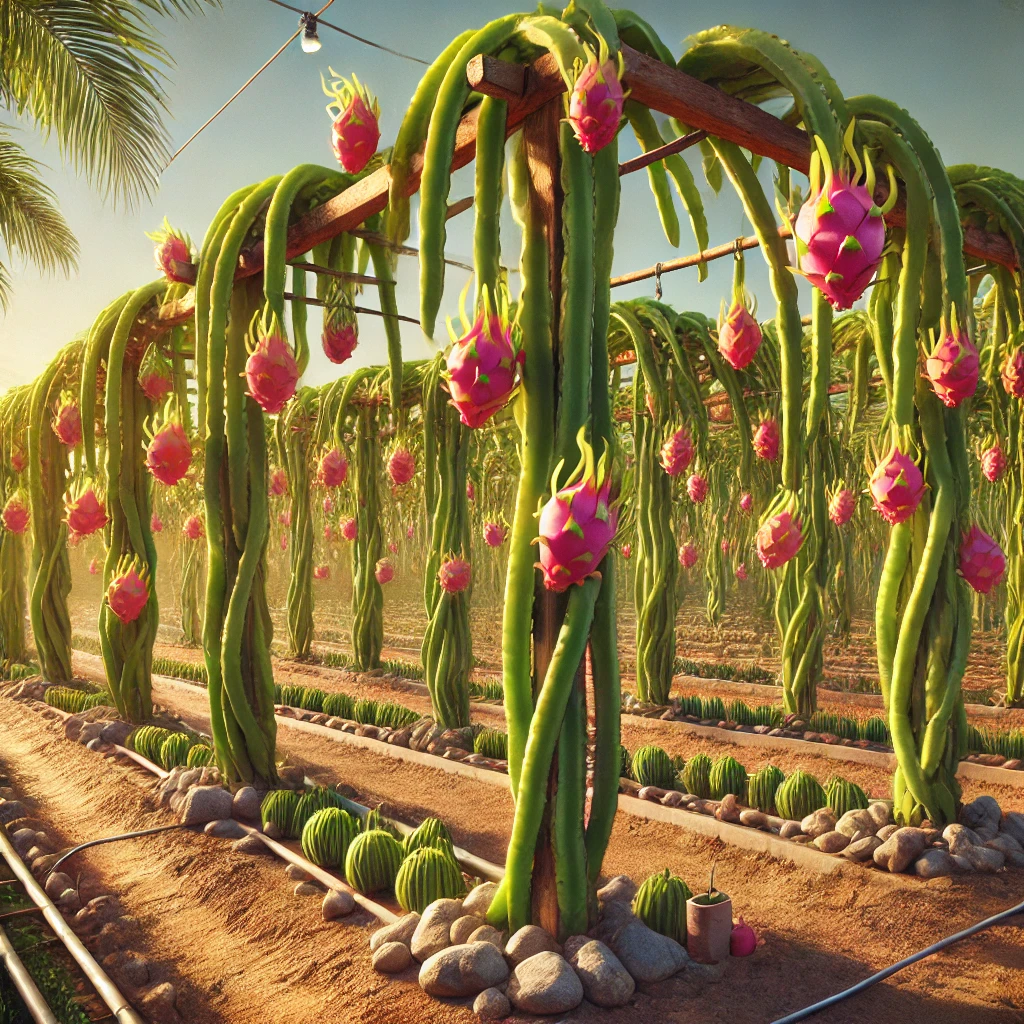Best Soil and Climate Conditions for Growing Dragon Fruit
Dragon fruit, also known as pitaya, is a strikingly beautiful tropical fruit that thrives in warm climates and well-drained soil. Whether you’re a home gardener or a commercial grower, understanding the best soil and climate conditions for growing dragon fruit is essential for a successful harvest. In this guide, we’ll cover everything you need to know about creating the perfect environment for dragon fruit cultivation.
Ideal Climate Conditions for Dragon Fruit
1. Temperature Requirements
Dragon fruit plants thrive in warm, tropical, and subtropical climates. The ideal temperature range for growing dragon fruit is between 65°F to 85°F (18°C to 30°C). While the plant can tolerate short periods of cooler weather, prolonged exposure to temperatures below 40°F (4°C) can cause damage.
2. Sunlight Needs
Dragon fruit is a cactus, which means it requires plenty of sunlight. For optimal growth:
- Provide at least 6 to 8 hours of direct sunlight daily.
- If growing in extremely hot climates, partial shade during peak afternoon hours can prevent sunburn.
3. Humidity and Rainfall
Dragon fruit thrives in areas with moderate to high humidity (around 60-80%) and an annual rainfall of 20-50 inches. However, excessive moisture can lead to root rot, so proper drainage is essential.
4. Wind Protection
While dragon fruit plants can tolerate some wind, strong winds can damage their delicate climbing vines. If you live in a windy area, consider planting windbreaks or growing near walls or fences for protection.
Best Soil Conditions for Dragon Fruit
1. Soil Type and Drainage
Dragon fruit prefers well-draining, sandy, or loamy soil. Since dragon fruit roots are prone to rot in overly wet conditions, using soil that allows excess water to escape is crucial.
Recommended Soil Mix:
- Sandy loam or loamy soil (preferred for aeration and drainage).
- Cactus soil mix with added perlite or sand.
- Raised beds or containers with proper drainage holes for better control over soil conditions.
2. Soil pH Level
The ideal soil pH for dragon fruit cultivation ranges between 6.0 to 7.0 (slightly acidic to neutral). You can test your soil’s pH using a soil testing kit and amend it accordingly:
- If soil is too acidic (below 6.0): Add agricultural lime.
- If soil is too alkaline (above 7.0): Add organic matter like compost or sulfur.
3. Organic Matter and Fertility
Enriching your soil with organic compost or well-rotted manure can enhance fertility and improve dragon fruit growth. Key nutrients dragon fruit needs include:
- Nitrogen (N) for vine growth.
- Phosphorus (P) for root and flower development.
- Potassium (K) for fruit production and overall plant health.
How to Prepare Soil for Planting Dragon Fruit
Step 1: Choose a Planting Location
Pick a sunny, well-draining area with minimal exposure to strong winds.
Step 2: Improve Drainage
If your soil retains too much moisture, add sand, perlite, or organic mulch to enhance drainage.
Step 3: Test and Adjust pH
Use a soil test kit to determine the pH level and make necessary adjustments.
Step 4: Enrich Soil with Nutrients
Mix in compost, manure, or organic fertilizers before planting.
Common Soil and Climate Issues and How to Fix Them
1. Soil Too Compact?
- Solution: Add sand, perlite, or organic matter to improve aeration.
2. Poor Drainage Leading to Root Rot?
- Solution: Use raised beds or containers with drainage holes.
3. Too Much Rain or Humidity Causing Fungal Issues?
- Solution: Ensure good airflow around plants and apply organic fungicides like neem oil.
4. Cold Temperatures Affecting Growth?
- Solution: Cover plants with frost blankets or move potted plants indoors during cold weather.
Final Thoughts: Creating the Perfect Growing Environment for Dragon Fruit
To successfully grow dragon fruit, ensure warm temperatures, well-draining soil, and proper sunlight exposure. By preparing the right soil mix, optimizing pH levels, and protecting plants from extreme weather, you can enjoy a healthy, thriving dragon fruit plant with bountiful fruit production.
Are you growing dragon fruit? Share your experience in the comments! For more gardening tips, plant care guides, and expert growing advice, don’t forget to subscribe to our blog!



